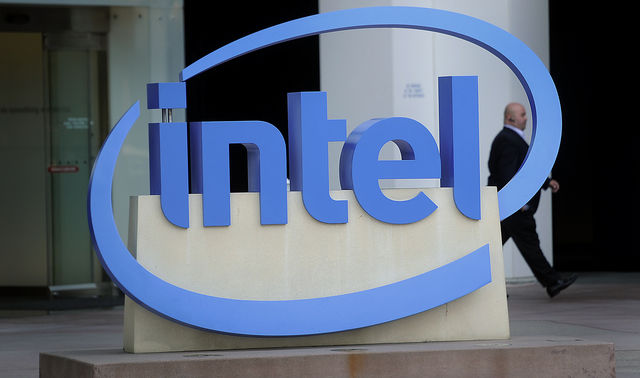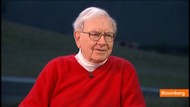Berkshire Posts 25% Intel Gain by Shunning Buy-and-Hold
Berkshire Hathaway Inc. (BRK/A) locked in a gain on its Intel Corp. (INTC) bet by selling its stake less than a year after making the investment, shunning the buy-and-hold strategy favored by Chairman Warren Buffett.
Berkshire’s Geico unit accumulated 11.5 million shares of Santa Clara, California-based Intel in the second half of 2011 for an average price of about $22 each, according to National Association of Insurance Commissioners data compiled by Bloomberg. Buffett’s firm sold the stake in the world’s largest semiconductor maker for an average price of $27.25 this year through May 8, netting about $60 million in profit.
The holding period is short for Omaha, Nebraska-based Berkshire, which Buffett built through acquisitions and by accumulating the biggest stakes in companies such as American Express Co. The billionaire has been handing more responsibility over the $86.2 billion stock portfolio to his deputies, Ted Weschler and Todd Combs, as part of a succession plan. The back- up stock pickers are responsible for Berkshire’s smaller holdings, while Buffett manages larger stakes.
“Warren has always had an opportunistic arbitrage appetite, and the new investors share some of that,” Tom Russo, partner at Berkshire investor Gardner Russo & Gardner, said in a phone interview. The Intel trade reflects an “old and more traditional” style of value investing that relies on buying attractively priced stocks and selling when shares rise to a target, he said.
Intel Investment
Berkshire accumulated 5.66 million Intel shares in the days through Aug. 8, 2011, for an average price of $22.05, the NAIC data show. Buffett’s company bought an additional 5.84 million shares through Oct. 20 that year for an average price of $21.46. At those prices, the investment would have generated a 25 percent gain, or $63.2 million in profit.
Liquidating the full stake by May 8 helped Berkshire avoid a 15 percent slide in the semiconductor maker’s stock in the last four months. The company cut its third-quarter sales estimate on Sept. 7, forecasting $12.9 billion to $13.5 billion, down from a prior projection of $13.8 billion to $14.8 billion, citing declining demand.
PC makers are reducing orders for Intel’s chips at a time of the year when they normally buy more to build products for the holiday shopping season. Intel said demand for chips used in business machines and orders in emerging markets are lower than expected, compounding concern that the PC market may not grow this year as consumers flock to smartphones and tablets.
Market Weakness
“We started to see talk of PC-market weakness right out of the end of the first quarter,” said Cody Acree, an analyst at Williams Financial Group who advises clients to hold Intel shares. “A $27 trade out would make a lot of sense.”
Microsoft Corp.’s decision to open the new version of its Windows operating system to chip technology other than Intel’s created an opportunity for rivals such as Qualcomm Inc. to gain market share in the PC-processor market for the first time, Acree said.
Intel doesn’t discuss stock transactions by investors and declined to comment on revenue guidance and business conditions, said Laura Anderson, a company spokeswoman. Berkshire declined to comment.
Some of Berkshire’s largest holdings, including stakes in Coca-Cola Co. and Wells Fargo & Co., date back more than a decade. Buffett has criticized so-called high-frequency trading, in which computer algorithms exploit small variations in prices, as a tax on investors. In February, the billionaire wrote that holding large amounts of stock in “first-class businesses” over the long term will generate better returns than bonds, gold and other assets often deemed safe.
Hold Forever
“When we own portions of outstanding businesses with outstanding managements, our favorite holding period is forever,” he said in a 1989 letter to shareholders after Berkshire began accumulating Coca-Cola shares. “We are just the opposite of those who hurry to sell and book profits when companies perform well but who tenaciously hang on to businesses that disappoint.”
Not all Berkshire investments have been for the long haul. Buffett cut stakes in consumer-products companies including Johnson & Johnson (JNJ) and Kraft Foods Inc. in the three months ended June 30, according to regulatory filings.
Berkshire sold a PetroChina Co. stake in 2007 for $4 billion after investing $488 million in 2002 and 2003. It made the initial investment because Buffett and Vice Chairman Charles Munger thought the Chinese oil company was worth about triple the price they paid, the billionaire wrote in a 2008 letter to shareholders. They sold when the value climbed to levels commensurate with other giant oil companies, he said.
New Leadership
Buffett, 82, is readying a new generation of leaders at Berkshire as he prepares to hand over control of the company. Part of that strategy involved hiring Weschler, 51, and Combs, 41, to help oversee investments. The two managers will probably each run $4 billion portfolios and have the authority to allocate funds “exactly as they see fit,” Buffett told Bloomberg Television’s Betty Liu in July.
The NAIC data, which lags behind Berkshire’s reporting to the U.S. Securities and Exchange Commission, provides a more- detailed look at Berkshire’s investments for any given period.
The NAIC statements provide purchase dates and prices for holdings at regulated insurance companies that aren’t included in Berkshire’s quarterly filings to the SEC. When stakes are built across multiple days, the NAIC allows companies to consolidate acquisitions under the date of the last purchase.
To contact the reporter on this story: Noah Buhayar in New York at nbuhayar@bloomberg.net.
To contact the editor responsible for this story: Dan Kraut at dkraut2@bloomberg.net

Warren Buffett

Chris Machian/Bloomberg
Warren Buffett, chairman and chief executive officer of Berkshire Hathaway Inc.
Warren Buffett, chairman and chief executive officer of Berkshire Hathaway Inc. Photographer: Chris Machian/Bloomberg
July 13 (Bloomberg) -- Warren Buffett, the billionaire chairman of Berkshire Hathaway Inc., talks about JPMorgan Chase & Co.’s $4.4 billion trading loss at its chief investment office and the U.S. banking industry. Buffett also discusses his investment strategy and holdings, the U.S. economy and housing market, and the outlook for the euro. He speaks with Betty Liu at the the Allen & Co. media conference in Sun Valley, Idaho, on Bloomberg Television's "In the Loop." (Source: Bloomberg)

Berkshire Posts Intel Gain

Noah Berger/Bloomberg
Berkshire Hathaway Inc. posted a 25 percent gain on holdings in Intel Corp. by selling its stake less than a year after making the investment, shunning the buy-and-hold strategy favored by Chairman Warren Buffett.
Berkshire Hathaway Inc. posted a 25 percent gain on holdings in Intel Corp. by selling its stake less than a year after making the investment, shunning the buy-and-hold strategy favored by Chairman Warren Buffett. Photographer: Noah Berger/Bloomberg

Berkshire Hathaway Chairman Warren Buffet

Scott Eells/Bloomberg
Berkshire Hathaway Inc. posted a 25 percent gain on holdings in Intel Corp. by selling its stake less than a year after making the investment, shunning the buy-and-hold strategy favored by Chairman Warren Buffett.
Berkshire Hathaway Inc. posted a 25 percent gain on holdings in Intel Corp. by selling its stake less than a year after making the investment, shunning the buy-and-hold strategy favored by Chairman Warren Buffett. Photographer: Scott Eells/Bloomberg
More News:
- U.S. ·
- Funds ·
- Stocks ·
- Finance ·
- Insurance ·
- Personal Finance ·
- Consumer Technology












 Rate this Page
Rate this Page
Bloomberg moderates all comments. Comments that are abusive or off-topic will not be posted to the site. Excessively long comments may be moderated as well. Bloomberg cannot facilitate requests to remove comments or explain individual moderation decisions.